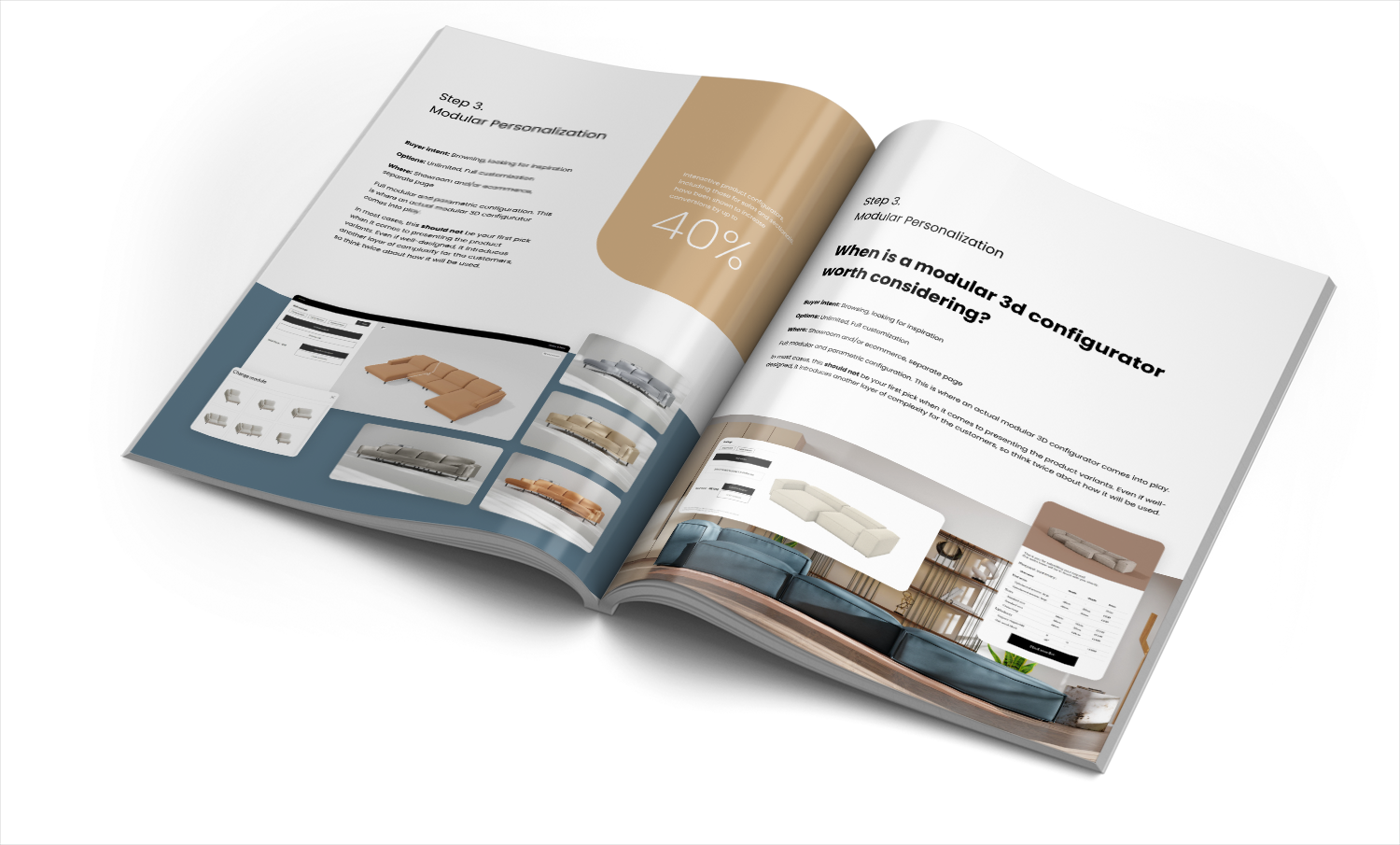The Ultimate 2025 Sofa Configuration Guide
Get your free copy todayy!

Content markdown: Furniture retailers have a high bar to clear when it comes to projecting professionalism. Customers investing in high-ticket, tactile products like sofas and cabinetry expect not just quality, but credible expertise and impeccable service. Outdated showrooms—or digital solutions that don’t meet expectations—instantly undermine this trust. Here’s how modern showroom technology directly affects perceived professionalism, and what outcomes you can expect by upgrading your approach.
Many furniture brands suffer from a visible gap between their online and in-store experiences. Customers begin their journey customizing at home, only to find static displays or paper brochures in the showroom. This friction signals a lack of cohesion and can make your brand seem behind the times, reducing confidence in purchase decisions.
Integrated 3D configurators—available on kiosks, tablets, and desktops—ensure seamless handoff from online dreaming to in-showroom confirmation. By letting customers see, touch, and interact with real materials while visualizing instant changes on a screen, you create the sense of a technologically advanced, customer-centric business. Studies show that brands with unified digital-physical journeys double their conversion rates; customers trust brands who let them pick up exactly where they left off. Learn more about how you can use the same configurator online and in showrooms to create continuity across channels.
A complex offer—dozens of finishes, layouts, and accessories—can overwhelm buyers, especially if presented with traditional static arrangements. Sales teams become bogged down in manual quoting, errors increase, and the professional image suffers as a result.
Smart showroom tech, such as CPQ (Configure, Price, Quote) platforms, automate complex configurations and pricing in real time. This clarity simplifies decision-making for customers and empowers staff to act as expert guides rather than order-takers. Case studies reveal that automated configurators cut quoting errors by 80% and reduce the sales cycle by up to 40%, visibly boosting perceived professionalism and efficiency. Discover how visual CPQ tools for cabinets and wardrobes streamline pricing and quoting accuracy while enhancing the customer experience.
Outdated or crowded displays limit what you can showcase, and grainy catalogs fail to engage. Physical limitations—often driven by rising real estate costs—leave customers with doubts about whether the showroom truly represents the brand’s full capabilities.
Digital showroom solutions—3D visualizations, VR/AR tools, and high-res lifestyle imagery—provide an infinitely adaptable presentation layer without the need for extra physical space. Visitors can explore entire product ranges, visualize “before and after” scenarios, and interact with every possible option. According to recent implementations, furniture brands report a 35–60% higher attach rate on upgrades and accessories when interactive visualization is available, directly enhancing the business’s reputation for expertise and innovation. Explore the impact of photorealistic AR/VR visualization on customer engagement and attachment rates. Also, the role of lifestyle images in configurators is critical in closing the “imagination gap,” enhancing decision-making.
Showroom visits often fizzle post-visit—lead data is lost, follow-ups forgotten, and undecided customers never re-engaged. This not only wastes acquisition costs, it signals a lack of organization and aftercare, eroding the trust professional brands need to build.
By syncing showroom interactions with your CRM, you can automate tailored post-visit outreach. Save customer configurations, automate reminders and offers, and personalize communications with content and incentives matched to individual interests. This closes the loop, demonstrates true professionalism, and nurtures customers into confident, loyal buyers. Understand best practices for connecting configurator outputs to CRM systems to enhance lead tracking and follow-up automation. Additionally, learn what should happen after someone configures a product but doesn’t buy to reduce lost sales and maximize conversions.
| Feature | Pain Point Addressed | Professionalism Effect | Measured Impact |
|---|---|---|---|
| 3D Product Configurator | Complex options overwhelm customers | Communicates technical competence & service focus | 2x higher conversion rates, 80% fewer quoting errors |
| Integrated Online/Offline Journey | Disjointed experience reduces trust | Projects consistency, commitment, and reliability | Shorter decision cycles, higher NPS |
| Photorealistic AR/VR Visualization | Outdated displays limit engagement | Signals innovation, future focus, and full-range expertise | 35–60% higher attach rate on accessories/upgrades |
| CRM-Synced Follow-up Automation | Lead loss and poor aftercare erode trust | Underlines meticulousness and customer dedication | 70% improvement in post-visit engagement |
When you combine tactile, high-quality products with best-in-class digital showroom technology, your business does more than display furniture—it radiates credibility, expertise, and customer commitment. Each touchpoint, from configuration to follow-up, builds long-term trust and maximizes the value of every lead and every square meter.
Brands that excel in showroom presentation don’t just impress—they win, turning one-off buyers into loyal advocates. For insights on how to use speed and clarity as a competitive edge in your sales process, and how a configurator can scale sales without scaling headcount, explore AR-Range’s knowledge base.
Ready to see how tangible the impact could be for your business? Book your free, 30-minute consultation now, and get actionable advice on turning your showroom into a true center of professionalism and profit.